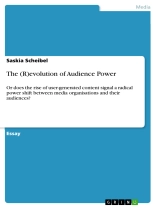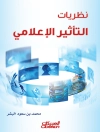Essay from the year 2011 in the subject Communications – Multimedia, Internet, New Technologies, grade: ‘Distinction’ (< 1, 3), London School of Economics (Media and Communications), course: The Audience in Media and Communications, language: English, abstract: “Will the internet set us free?” is the provoking question Mc Chesney (1999) raised a decade ago (pp. 119). By this he means if new modes of communication will relativise the supposed dominant power of media organisations. It would not be the first time in the history of media that a new form of media challenges the power of established media organisations (Curran, 2002). Especially with the rise of user-generated-content – finally enabling the audience to create their own meanings (Bruns, 2007) – has undeniable potential to break with old power structures in favour of the audience. This power shift, however, might just be a moment of euphoria rather than a long-term condition since it seems unlikely that big corporate media organisations will witness their disempowerment passively. The following discourse will illustrate why a power shift between media organisations and their audiences is, indeed, visible but cannot be considered radical. This notion will be supported by examples of empirical research taking into account the complex nature of power relations and the contradicting views related to media power before and after the rise of user-generated-content.
Saskia Scheibel
The (R)evolution of Audience Power [PDF ebook]
Or does the rise of user-generated content signal a radical power shift between media organisations and their audiences?
The (R)evolution of Audience Power [PDF ebook]
Or does the rise of user-generated content signal a radical power shift between media organisations and their audiences?
Cumpărați această carte electronică și primiți încă 1 GRATUIT!
Limba Engleză ● Format PDF ● ISBN 9783640956265 ● Mărime fișier 0.5 MB ● Editura GRIN Verlag ● Oraș München ● Țară DE ● Publicat 2011 ● Ediție 1 ● Descărcabil 24 luni ● Valută EUR ● ID 3926811 ● Protecție împotriva copiilor fără












